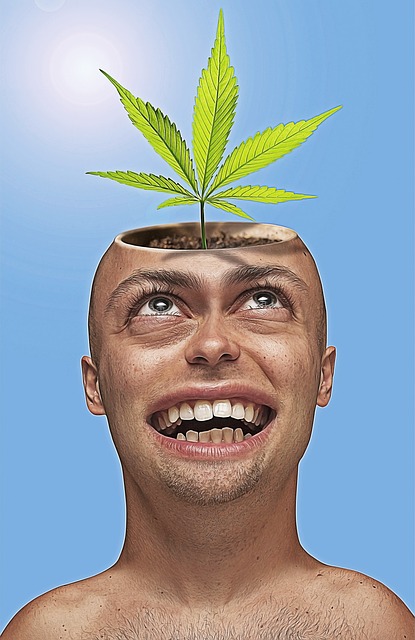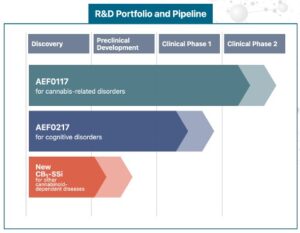
In June of 2023, Columbia University announced that a Phase 2a clinical trial, jointly led by Columbia and the French biopharmaceutical company Aelis Farma, found that AEF0117 “significantly reduced the effects of cannabis in daily cannabis smokers.” The lead author of the study thought the drug has “great potential” for the treatment of cannabis use. Cannabis is currently legal for recreational use in 24 states, and legal for medical use in 38 states, four out of five U.S. territories and the District of Columbia. And consumption is increasing, along with problems from its use.
Published in the journal Nature Medicine, “Signaling-specific inhibition of the CB1 receptor for cannabis use disorder: phase 1 and phase 2a randomized trials,” said AEF0117 was well tolerated and did not precipitate cannabis withdrawal, suggesting it was a safe and potentially effective treatment for cannabis use disorder (CUD). AEF0117 is the first of a new class of pharmacological drugs (CB1-SSi), acting as a signaling-specific inhibitor of the cannabinoid receptor. It inhibits the effects resulting from THC binding without disrupting the receptors’ physiological and behavioral functions (i.e., with memory, learning, emotional processing, sleep, and eating). The clinical development of AEF0117 is supported by grants from NIDA-NIH.
Twenty-nine volunteers were recruited (all but one who were male) and smoked an average of 2.9 grams of cannabis daily, 6.9 days per week. The severity of CUD was diagnosed as mild (34.5%), moderate (44.8%) and severe (20.7%) across the participants.
The main objectives of the study were to evaluate the effects of AEF0117 on the perceived ‘good effect’ of cannabis as a measure of abuse liability and on self-administration. An additional objective was to determine if AEF0117 reversed cannabis’ effects on cognitive performance, pain threshold and heart rate. However, cannabis did not produce significant cognitive or analgesic effects relative to baseline in the present study design, so it was not possible to determine whether AEF0117 reversed these effects. In addition, because of institutional regulations regarding data privacy, we were not able to collect heart rate data as originally planned.
Reproducing the effects of a natural mechanism to counteract CB1 overactivation, the drug can inhibit the effects of THC without altering the basal activity of the CB1. “Therefore, these compounds seem to have no effect on normal behavior and physiological activity while decreasing cannabis’ abuse-related and reinforcing effects, resulting in a well-tolerated and potentially efficacious therapy for CUD.”
The general director for Aelis Farma, Pier Vincenzo Piazza, told Medscape Medical News in June of 2023, “We thought that it would be impossible to modulate part of a receptor by a molecule. But in 2014, we discovered this unexpected natural mechanism precisely at the level of the CB1 cannabinoid receptors.” Piazza and his colleagues demonstrated that in response to high doses of THC, a hormone or neurosteroid called pregnenlone becomes bound to CB1 receptors and then reduces some of the effects of THC. A 2022 study in Current Opinion in Endocrine and Metabolic Research said: “Pregnenlone is one of the most abundant neurosteroids and the precursor to all neurosteroids found in the brain.” Evidence for its therapeutic potential for addiction and other psychiatric disorders had been demonstrated in multiple studies.
Medscape Medical News reported that Piazza then created a synthetic molecule that could mimic the effects of pregnenolone on CB1 receptors. He referred to the results of the Phase 2a clinical trial of AEF0117 as having a triple action: it reduced the desire to use it, had a lack of withdrawal symptoms, and reduced the positive effects of cannabis.
This looked promising to Indivior who partnered with Aelis Farma in 2021, giving an upfront payment of $30 million to license AEF0117 when it was brought to market. Fierce Biotech reported that if Aelis Farma successfully completed its Phase 2b study, Indivior would pay an additional $100 million. Indivior sells Sublocade and Suboxone, MAT treatments for opioids. Piazza said:
We are very excited to collaborate with Indivior, whose experience developing approved treatments for addiction and serious mental illnesses will accelerate the development of our new class of therapeutics and the unique approach to cannabis use disorders they provide.
In September of 2024 Drug Discovery World reported that Aelis Farma announced the results of its Phase 2B clinical trial study of AEF0117. Aelis randomized 333 participants with moderate to severe CUD to receive one of three doses of AEF0117 or placebo for 12 weeks: 0.1, 0.3, and 1 mg once a day for 12 weeks). Eighty-two percent of the participants had severe CUD. The purpose of the trial was to show that AEF0117 lowered cannabis use, and to determine the end points and optimal dosage of AEF0117 for future studies.
The study’s primary endpoint (proportion of participants reducing their cannabis use to ≤1 day per week) and the secondary endpoint (proportion of participants reaching either complete abstinence or reducing cannabis use to ≤2 day per week) did not differ from placebo. At the end of the treatment period, the participants with the highest dose of 1mg/day, had a nearly statistically significant effect for anxiety and depression scores and sleep quality.
Fierce Biotech reported the failure of the study prompted Indivior to say it would not exercise its option with Aelis Farma at this time. “The prompt dampening of expectations about the likelihood of a deal followed an analysis of clinical data that paints a bleak picture of the prospects of AEF0117.” Aelis has yet to share the data behind the failure of the Phase 2b clinical trial. “The data are a blow to the hypothesis that selectively blocking CB1 can decrease cannabis use by inhibiting signaling pathways that drive its intoxicating effects.”
Aelis is still reviewing the results and is yet to decide on the next steps. Indivior doesn’t intend to take up its option, although it is yet to conclusively abandon the deal, and favorable clinical data could shift its thinking.
Further Research with CB1-SSi Substances
Let’s reflect on the findings from the two clinical trials with AEF0117 and ask some questions that need to be answered in the next research steps by Aelis Farma. But first, a brief review of the above description of the two clinical trials.
The Phase 2a trial was small, consisting of 29 participants. They were almost all male, and only had 20.7% whose CUD diagnosis was severe. Although the data for the Phase 2b trial has not been released yet, we know there were 333 participants, of whom 82% had a severe CUD diagnosis. And the highest dose of AEF0117 was 1mg/day. We don’t yet know the sexes of the Phase 2b participants.
Did the small size and skewed gender of the participants in the Phase 2a clinical trial contribute to its positive findings? We’ll need to know the sexes of the Phase 2b participants. Was the failure to find a statistical difference from placebo in the Phase 2b clinical trial because the dosage was limited to 1mg/day? And if the dosage in future trials is increased, do safety and efficacy concerns with AEF0117 increase?
Then there is the difference in the CUD diagnosis of participants in the trials. Were the significant Phase 2a findings a result of only having 20.7% of its participants with a severe CUD diagnosis? Did having 82% of the Phase 2b participants with a severe CUD diagnosis influence the outcome of no difference from placebo on its primary and secondary outcomes? Does this mean that a severe CUD diagnosis will require a higher dose of AEF0117 than 1mg/day? Or does a severe CUD diagnosis negate the positive effects of AEF0117?
Aelis Farma has additional plans for its pharmacological class of CB1 inhibitors, even developing new treatments for other cannabinoid-dependent diseases such as: Autism Spectrum Disorder, ADHD, and PTSD. They also have another CB1-SSi, AEF0217, specifically designed to treat cognitive impairments like Downs Syndrome. See the following graphic taken from the Pipeline page for Aelis Farma.
Identifying a way to neutralize the effects of THC could be a useful goal given that the movement towards legalizing recreational cannabis has become a platform promise by a presidential candidate for 2024. The concentration of THC in cannabis is steadily increasing (from around 3% in the 1980s to 12% in 2012), and the research on its adverse effects, such as 25-50% of daily users of cannabis become addicted. Regular cannabis/marijuana use is associated with an increased risk of anxiety and depression. It’s also linked with psychoses, especially among people with a preexisting genetic vulnerability.
Marijuana use has been associated with substantial adverse effects, some of which have been determined with a high level of confidence. Marijuana, like other drugs of abuse, can result in addiction. During intoxication, marijuana can interfere with cognitive function (e.g., memory and perception of time) and motor function (e.g., coordination), and these effects can have detrimental consequences (e.g., motor-vehicle accidents). Repeated marijuana use during adolescence may result in long-lasting changes in brain function that can jeopardize educational, professional, and social achievements. However, the effects of a drug (legal or illegal) on individual health are determined not only by its pharmacologic properties but also by its availability and social acceptability.






